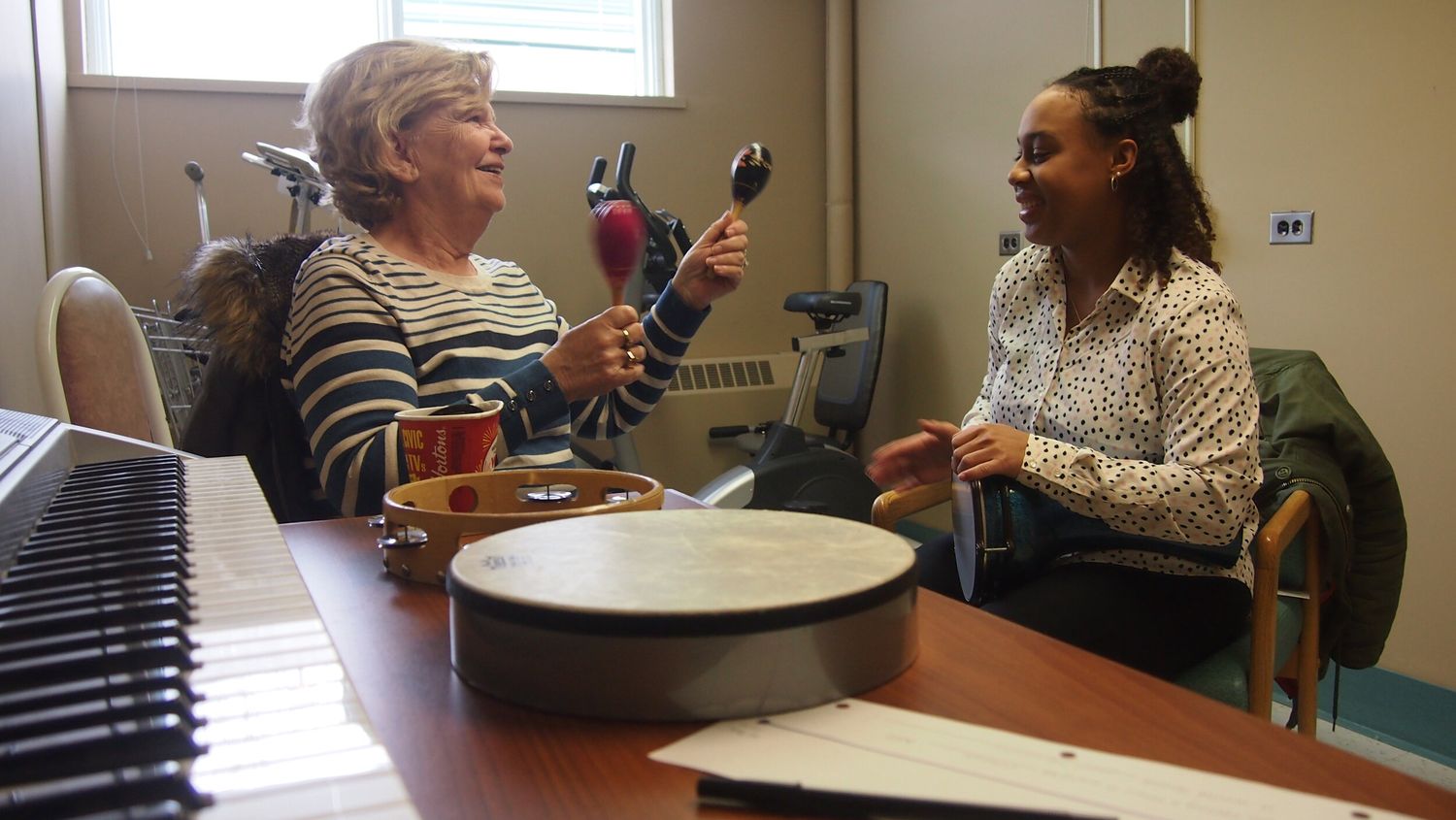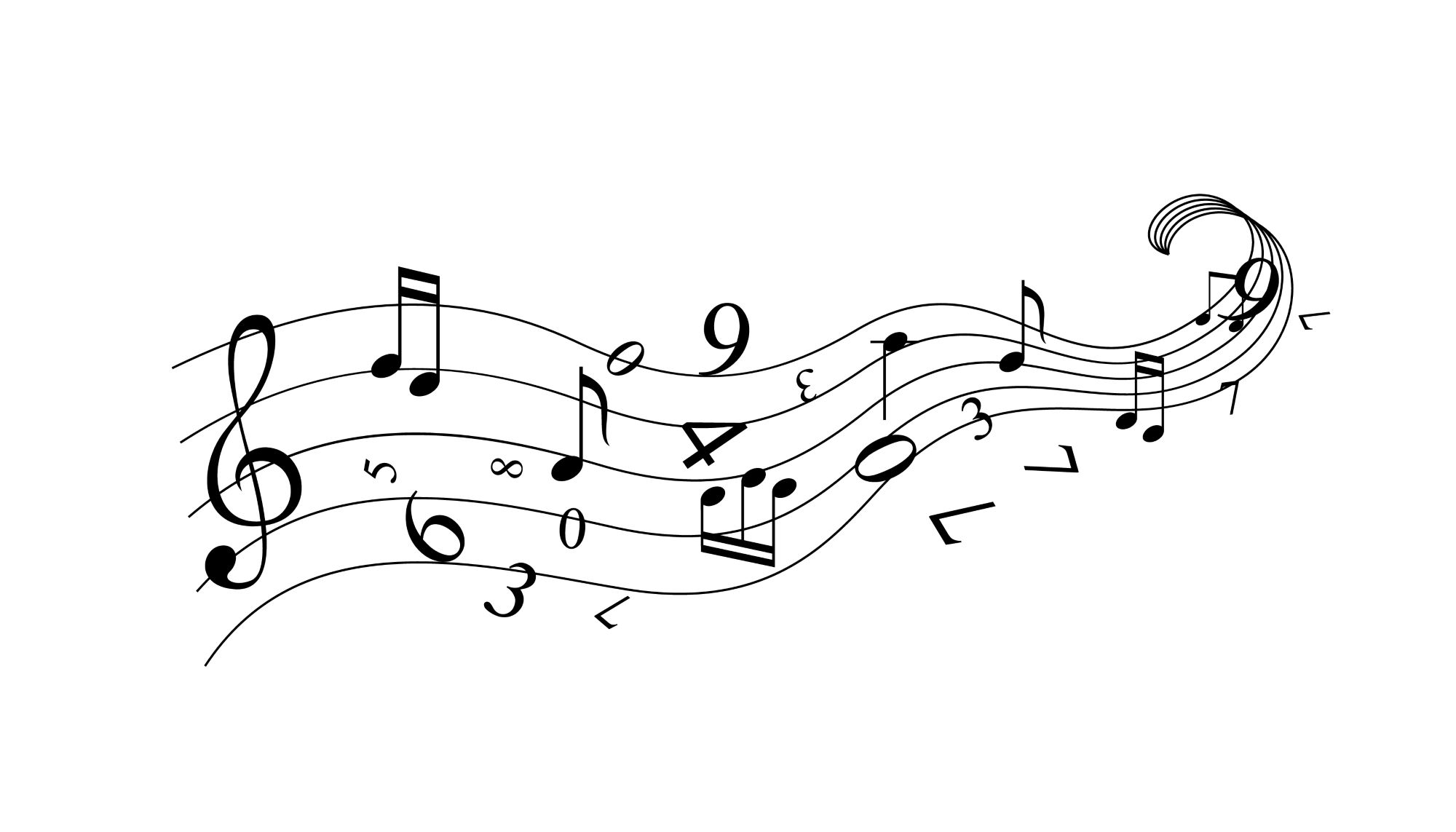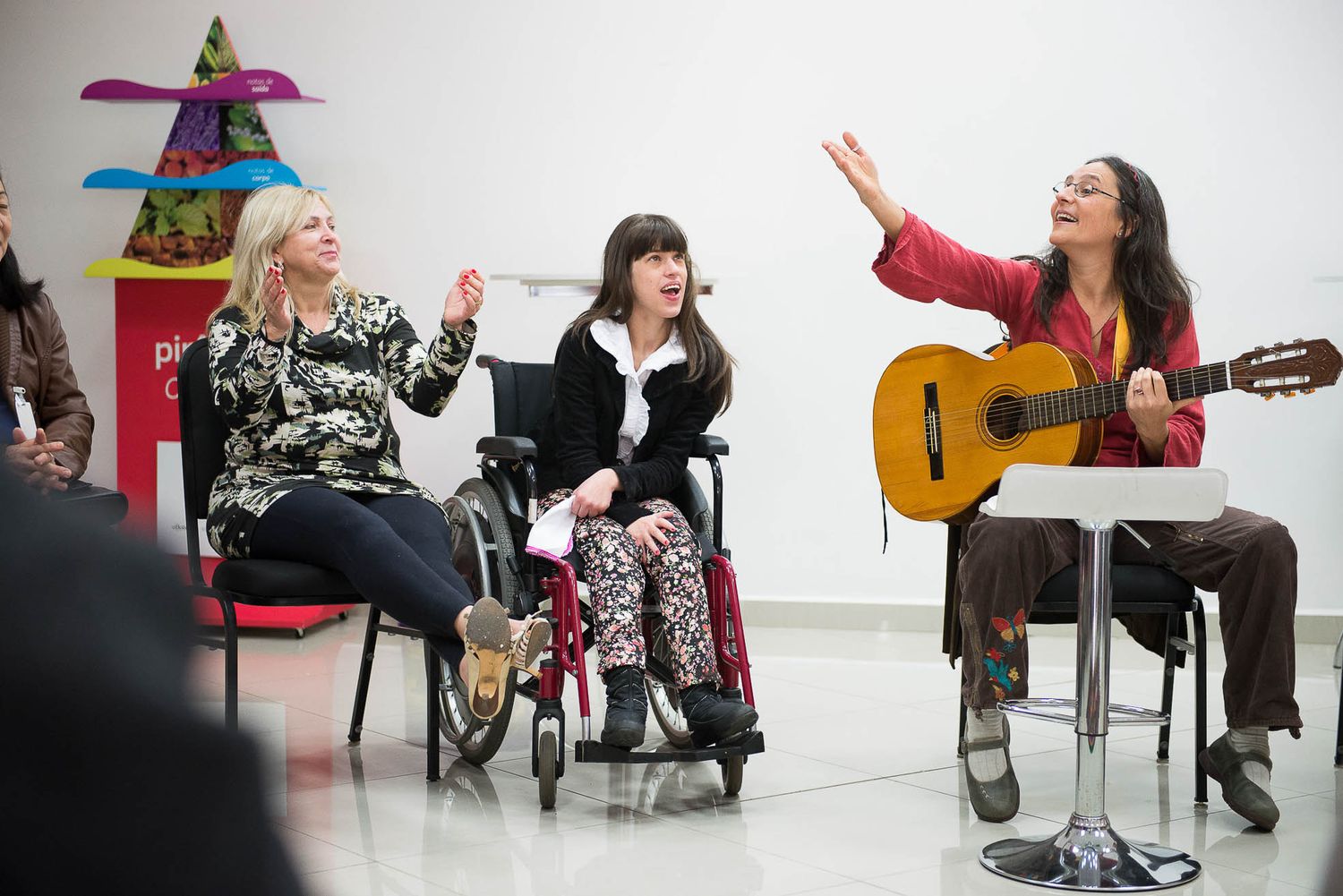Home>Events & Info>Music Therapy>How Does Music Therapy Help PTSD


Music Therapy
How Does Music Therapy Help PTSD
Published: February 2, 2024
Discover how music therapy can effectively help individuals suffering from PTSD. Explore the healing benefits of music therapy and its impact on PTSD recovery.
(Many of the links in this article redirect to a specific reviewed product. Your purchase of these products through affiliate links helps to generate commission for AudioLover.com, at no extra cost. Learn more)
Table of Contents
- Introduction
- Understanding PTSD
- What is Music Therapy?
- The Benefits of Music Therapy for PTSD
- How Music Therapy Helps with Trauma Processing
- Techniques Used in Music Therapy for PTSD
- Case Studies: Success Stories of Music Therapy for PTSD
- Limitations and Challenges of Music Therapy for PTSD
- Integrating Music Therapy with other PTSD Treatments
- Conclusion
Introduction
Post-Traumatic Stress Disorder (PTSD) is a complex mental health condition that affects millions of individuals worldwide. It can stem from experiencing or witnessing a traumatic event, such as military combat, natural disasters, physical or sexual assault, or childhood abuse. The symptoms of PTSD can be debilitating, including intrusive thoughts, flashbacks, nightmares, anxiety, depression, and difficulty concentrating or sleeping.
Traditional treatment approaches for PTSD often include medication and psychotherapy. However, in recent years, alternative therapies have gained recognition for their effectiveness in managing PTSD symptoms. One such therapy that has gained significant attention is Music Therapy.
Music Therapy is a holistic approach that utilizes the power of music to address emotional, cognitive, and physical challenges. It involves the use of music-based interventions facilitated by trained music therapists, who create tailored experiences and sessions to meet the unique needs of individuals with PTSD.
In this article, we will explore the benefits of Music Therapy for individuals with PTSD and how it can be used as a powerful tool for healing and trauma processing. We will also delve into the techniques and approaches used in Music Therapy for PTSD, as well as case studies that highlight the effectiveness of this therapeutic modality.
It is important to note that Music Therapy is not a standalone treatment for PTSD but should be integrated as part of a comprehensive treatment plan that may include medication and psychotherapy. However, when used in conjunction with traditional approaches, Music Therapy can serve as a valuable adjunctive therapy that enhances the overall well-being and recovery process of individuals with PTSD.
Now, let’s delve deeper into the world of Music Therapy and how it can help individuals on their journey towards healing and resilience.
Understanding PTSD
Post-Traumatic Stress Disorder (PTSD) is a psychiatric disorder that can develop after experiencing or witnessing a traumatic event. It is not uncommon for individuals who have been through life-threatening situations or highly distressing events to experience emotional and psychological challenges in the aftermath.
PTSD can affect anyone, regardless of their age, gender, or background. It may occur immediately after the traumatic event or take weeks, months, or even years to manifest. The symptoms of PTSD can be grouped into four main categories:
- Intrusion: This category includes intrusive thoughts, memories, and flashbacks of the traumatic event. Individuals with PTSD may experience recurrent nightmares or have intense and distressing reactions when exposed to triggers that remind them of the trauma.
- Avoidance: Individuals with PTSD often try to avoid anything that may trigger memories or reminders of the traumatic event. This may include avoiding certain places, people, activities, or conversations that may elicit distressing emotions.
- Negative alterations in cognition and mood: PTSD can significantly impact an individual’s thoughts, beliefs, and emotions. They may experience feelings of intense guilt, shame, or anger. Additionally, individuals with PTSD may struggle with memory problems, have difficulty concentrating, and may exhibit a negative outlook on life.
- Hyperarousal: This category includes symptoms such as irritability, hypervigilance, sleep disturbances, and exaggerated startle response. Individuals with PTSD may constantly feel on edge, leading to feelings of anxiety and restlessness.
PTSD can have a profound impact on an individual’s daily life, relationships, and overall well-being if left untreated. It is essential to seek professional help if you or someone you know is experiencing symptoms of PTSD. Treatment options, including psychotherapy and medication, can help individuals manage and alleviate their symptoms, promoting healing and recovery.
Now that we have a better understanding of PTSD let’s explore how Music Therapy can play a role in supporting individuals with this condition.
What is Music Therapy?
Music Therapy is a specialized field that utilizes the power of music to address physical, emotional, cognitive, and social needs of individuals. It is an evidence-based therapeutic approach that involves the use of music and musical elements to support individuals in achieving therapeutic goals.
Music therapists are trained professionals who possess a deep understanding of music and its therapeutic applications. They create safe and supportive environments where individuals can explore their emotions, express themselves, and work towards growth and healing.
During a Music Therapy session, various music-based interventions may be used, including listening to music, playing instruments, singing, songwriting, improvisation, and movement to music. The choice of interventions depends on the individual’s goals, preferences, and therapeutic needs.
Music has a unique ability to engage multiple areas of the brain and evoke emotional responses. It can access deeply held emotions, memories, and experiences, making it a powerful tool for healing and self-expression. The inherent structure and rhythm in music also provide a sense of predictability and stability, which can be comforting for individuals with PTSD.
Music Therapy offers a non-verbal means of communication and expression, allowing individuals to access and express their emotions in ways that words alone may not capture. This can be particularly beneficial for individuals with PTSD who may struggle to verbalize their experiences or find it difficult to talk about their trauma.
Furthermore, Music Therapy provides a creative outlet for individuals to explore and process their thoughts and feelings related to their traumatic experiences. It offers a space where individuals can regain a sense of control and empowerment, as they actively engage with music and participate in the therapeutic process.
It is important to note that Music Therapy is a client-centered approach. The music therapist collaborates with the individual with PTSD to co-create a therapeutic experience that is tailored to their specific needs and goals. The therapist may also involve family members or support systems in the therapy process to enhance social connections and promote healing within relationships.
Now that we have a better understanding of Music Therapy, let’s explore the specific benefits it can offer to individuals with PTSD.
The Benefits of Music Therapy for PTSD
Music Therapy has been shown to offer numerous benefits for individuals with Post-Traumatic Stress Disorder (PTSD). It can be used as a complementary treatment alongside traditional approaches, enhancing the overall well-being and healing process of individuals struggling with PTSD.
Here are some of the key benefits of Music Therapy for PTSD:
- Emotional Expression and Regulation: Music provides a non-verbal outlet for individuals to express and regulate their emotions. The emotional depth and intensity of music allow individuals to connect with their feelings related to their traumatic experiences and release pent-up emotions in a safe and controlled manner.
- Reduced Anxiety and Stress: Music has a calming effect on the nervous system, reducing feelings of anxiety and stress. Listening to soothing music or engaging in music-making activities can help individuals with PTSD relax, lower their heart rate, and ease muscle tension.
- Improved Mood and Well-being: Music has the power to uplift the spirit and enhance mood. It can bring about feelings of joy, hope, and positivity, providing a respite from the negative emotions associated with PTSD. Engaging in music therapy sessions can boost overall well-being and enhance a sense of pleasure and happiness.
- Enhanced Self-expression and Communication: For many individuals with PTSD, finding the right words to express their experiences and feelings can be challenging. Music therapy provides an alternative means of communication, allowing individuals to express themselves through music and sound. This can help in building a stronger sense of self-expression and improving communication skills.
- Strengthening Coping Skills: Participating in music therapy can help individuals develop and strengthen coping skills to manage the challenges associated with PTSD. Through songwriting, improvisation, or playing instruments, individuals can explore new ways of coping with stress, emotions, and triggers.
- Promoting Social Connection: Music has a powerful way of connecting people. Participating in group music therapy sessions can provide opportunities for individuals with PTSD to connect and interact with others who have experienced similar challenges. This can help reduce feelings of isolation and create a sense of belonging and support.
It is important to highlight that Music Therapy is a highly individualized approach. Each person’s experience with PTSD is unique, and the goals of therapy are tailored to the individual’s specific needs. Music therapists work closely with individuals to create a safe and supportive environment, where they can explore and address their PTSD symptoms effectively.
Now that we understand the benefits of Music Therapy for individuals with PTSD, let’s explore how Music Therapy helps with trauma processing.
How Music Therapy Helps with Trauma Processing
Music Therapy offers a unique and effective approach for trauma processing in individuals with Post-Traumatic Stress Disorder (PTSD). Trauma processing involves addressing and working through the distressing memories and emotions associated with the traumatic event in order to promote healing and recovery.
Here are some ways in which Music Therapy helps with trauma processing:
- Safe Space for Expression: Music Therapy provides a safe and non-judgmental space for individuals to express their emotions related to the trauma. The use of music as a medium allows individuals to release and process their feelings in a controlled and supportive environment.
- Symbolic Representation: Music can serve as a symbolic representation of the traumatic event and the associated emotions. Through guided imagery, songwriting, or improvisation, individuals can create musical expressions that capture the essence of their trauma. This symbolic representation can aid in understanding and processing the traumatic experience.
- Emotional Regulation: Music has a profound impact on emotions and can help individuals regulate their emotional responses. For individuals with PTSD, who may experience heightened emotional states, engaging in music therapy interventions can provide a sense of control and stability in managing overwhelming emotions.
- Building Resilience: Music Therapy focuses on building resilience in individuals with PTSD. Through music, individuals can explore themes of strength, hope, and empowerment. This exploration helps individuals develop a sense of resilience and agency, ultimately facilitating their journey towards healing and recovery.
- Integration of Mind and Body: Trauma impacts both the mind and body. Music Therapy offers interventions that engage both the cognitive and physical aspects of trauma processing. Through rhythmic activities, movement to music, and breathwork, individuals can integrate their mind and body, supporting the release and processing of traumatic memories.
- Creating New Narratives: Music Therapy allows individuals to create new narratives around their trauma. By rewriting lyrics, composing new musical pieces, or engaging in improvisation, individuals can redefine their relationship with the traumatic event and explore alternative perspectives and meanings.
It is important to note that trauma processing in Music Therapy is conducted in a gradual and client-centered manner, ensuring that individuals feel safe and supported throughout the process. The music therapist guides individuals through the exploration of their trauma at a pace that is comfortable for them, while also addressing their therapeutic goals and needs.
Through the power of music, individuals with PTSD can find healing, resilience, and a renewed sense of self. In the next section, we will explore the different techniques used in Music Therapy for trauma processing in PTSD.
Techniques Used in Music Therapy for PTSD
Music Therapy for Post-Traumatic Stress Disorder (PTSD) employs a variety of techniques and interventions to support individuals in their healing and recovery journey. These techniques are designed to address specific therapeutic goals and cater to the unique needs of each individual.
Here are some commonly used techniques in Music Therapy for PTSD:
- Guided Imagery and Music: This technique involves listening to specially selected music while engaging in a guided visualization or imagery exercise. The music serves as a catalyst for exploring and processing traumatic memories and emotions.
- Songwriting: Songwriting allows individuals to creatively express their thoughts and feelings related to their traumatic experiences. Writing lyrics and composing music can provide a sense of control and empowerment, allowing individuals to tell their story in their own unique way.
- Improvisation: Improvisation involves spontaneous, non-structured music-making. It allows individuals to freely express themselves and explore their emotions in the moment. Improvisation can provide a sense of liberation and facilitate the release and processing of traumatic memories.
- Movement to Music: Movement to music involves using body movements, dance, and rhythmic activities in combination with music. This technique helps individuals connect with their bodies and release tension, while also promoting emotional expression and trauma processing.
- Lyric Analysis: Lyric analysis involves exploring the meaning and emotions conveyed in song lyrics. By examining and discussing the lyrics of relevant songs, individuals can connect with the experiences and emotions expressed in the music and relate them to their own traumatic experiences.
- Instrument Playing: Playing musical instruments can be a powerful way to express emotions and engage in cathartic release. Individuals can use instruments to create specific sounds or rhythms that reflect their emotions, facilitating trauma processing and emotional regulation.
- Music Listening: Engaging in active music listening can elicit emotional responses and support individuals in connecting with their feelings related to their trauma. Carefully selected music can evoke specific emotions or provide a sense of comfort and validation.
It is important to note that these techniques are employed by trained music therapists who possess in-depth knowledge of music’s therapeutic potential. The music therapist assesses each individual’s needs, preferences, and therapeutic goals to determine which techniques would be most beneficial in their treatment.
Furthermore, the choice of techniques may evolve throughout the course of therapy as individuals progress in their healing journey. Music Therapy is highly adaptable and flexible, allowing therapists to tailor their approach according to the changing needs of individuals with PTSD.
Now that we have explored the techniques used in Music Therapy for PTSD, let’s turn our attention to real-life case studies that exemplify the effectiveness of this therapeutic modality.
Case Studies: Success Stories of Music Therapy for PTSD
Real-life case studies provide powerful evidence of the effectiveness of Music Therapy in supporting individuals with Post-Traumatic Stress Disorder (PTSD) on their healing journey. These success stories demonstrate the transformative impact that music can have on individuals’ lives, helping them navigate and overcome the challenges associated with PTSD.
Case Study 1:
Sarah, a military veteran, had been struggling with severe PTSD symptoms following her deployment in a war zone. Traditional therapies had limited success in addressing her symptoms. However, when Sarah started participating in Music Therapy sessions, she found a renewed sense of hope and healing. Through songwriting and lyric analysis, Sarah was able to process her traumatic experiences, express her emotions, and find a sense of empowerment. The creative outlet of music allowed her to develop coping strategies, gain control over her emotions, and reconnect with her identity beyond her military service. As a result, Sarah experienced significant improvement in her overall well-being and quality of life.
Case Study 2:
David, a survivor of a violent assault, had been experiencing intense anxiety, intrusive thoughts, and nightmares. Traditional therapies had provided some relief, but it was through Music Therapy that David truly started to heal. By engaging in movement to music and instrument playing, David was able to release the tension stored in his body and find a sense of control over his traumatic memories. Through the improvisation process, David gained a new perspective on his trauma, allowing him to rewrite his narrative and reclaim his sense of self. Over time, David experienced a reduction in his symptoms and developed increased resilience and confidence in facing the challenges associated with his PTSD.
These case studies highlight the unique and transformative power of Music Therapy in supporting individuals with PTSD. They demonstrate how music can facilitate healing, provide an outlet for expression, and help individuals regain control and strength in the face of trauma. Each case is a testament to the personalized and client-centered approach of Music Therapy, as therapists worked closely with individuals to create tailored interventions that met their specific needs.
It is important to note that these success stories are just a few examples, and the benefits of Music Therapy may vary for each individual. However, they serve as inspiration and evidence of the potential for healing and recovery through the use of music as a therapeutic tool.
As we continue to explore Music Therapy for PTSD, it is essential to be aware of the limitations and challenges associated with this approach, which we will discuss in the next section.
Limitations and Challenges of Music Therapy for PTSD
While Music Therapy has demonstrated effectiveness in supporting individuals with Post-Traumatic Stress Disorder (PTSD), it is important to acknowledge the limitations and challenges that may arise in its application.
Here are some key considerations regarding the limitations and challenges of Music Therapy for PTSD:
- Individual Variability: Each individual’s experience of trauma and response to therapy is unique. What works for one person may not work for another. It is crucial for music therapists to tailor their approach to meet the specific needs and therapeutic goals of each individual.
- Severity and Complexity of PTSD: Music Therapy may not be the sole treatment for individuals experiencing severe or complex PTSD. In such cases, a multidisciplinary approach, involving medication and psychotherapy, may be necessary to address the complexity of symptoms and underlying trauma.
- Resistance and Triggers: Engaging with traumatic memories and emotions can be challenging for individuals with PTSD. Music Therapy may trigger distressing memories or emotions, and some individuals may be resistant to engaging in therapeutic activities. It is important for music therapists to create a safe and supportive environment and to proceed at a pace that is comfortable for the individual.
- Access to Music Therapy Services: Access to qualified music therapists and Music Therapy services may be limited in certain areas. This may pose a challenge for individuals seeking Music Therapy as part of their PTSD treatment. It is important to explore options for remote or online Music Therapy services if in-person services are not readily available.
- Research Limitations: While there is a growing body of research supporting the effectiveness of Music Therapy for PTSD, more research is needed to further validate its benefits and understand its mechanisms of action. Continued research can provide a stronger evidence base and contribute to the development of best practices in Music Therapy for PTSD.
Despite these limitations and challenges, Music Therapy remains a valuable and effective therapeutic modality for individuals with PTSD. Its person-centered and creative approach allows for individualized support, emotional expression, and trauma processing.
Integrating Music Therapy with other PTSD treatments, such as medication and psychotherapy, can enhance the overall treatment plan and improve outcomes. Collaborative efforts among healthcare providers can ensure that individuals receive the best possible care that addresses their unique needs and promotes holistic healing.
Now, let’s explore the integration of Music Therapy with other PTSD treatments in the next section.
Integrating Music Therapy with other PTSD Treatments
When it comes to treating Post-Traumatic Stress Disorder (PTSD), a comprehensive and multidisciplinary approach is often the most effective. Music Therapy can play a valuable role in this treatment plan by integrating with other PTSD treatments, such as medication and psychotherapy.
Here are a few ways in which Music Therapy can be integrated with other PTSD treatments:
- Collaboration with Mental Health Professionals: Music therapists work collaboratively with mental health professionals, including psychologists and psychiatrists, to ensure a coordinated approach to treatment. This collaboration allows for a holistic understanding of the individual’s needs and ensures that the various treatment modalities are aligned and complement each other.
- Adjunct to Psychotherapy: Music Therapy can serve as an adjunct to psychotherapy, enhancing the therapeutic process. It can help individuals process trauma-related emotions, provide a creative outlet for expression, and facilitate the development of coping strategies. The combination of talk therapy and Music Therapy can address the cognitive, emotional, and behavioral aspects of PTSD more comprehensively.
- Complementing Medication: Music Therapy can complement medication treatment for individuals with PTSD. While medication may address symptoms such as anxiety or insomnia, Music Therapy can target other dimensions of PTSD, including emotional regulation, trauma processing, and the development of healthy coping skills. The combination of medication and Music Therapy can provide individuals with a well-rounded treatment approach.
- Shared Goals and Communication: Integration of treatments requires clear communication and shared treatment goals among healthcare providers. The music therapist, along with mental health professionals, can work collaboratively to ensure consistency in the therapeutic approach, monitor progress, and make necessary adjustments to the treatment plan as needed.
- Supportive Environment: Music Therapy sessions can create a supportive environment where individuals feel safe to explore and express their emotions. This supportive environment can serve as a foundation for individuals to engage more effectively in other treatments and foster a sense of trust and connection with healthcare providers.
Integrating Music Therapy with other treatments provides a comprehensive approach to addressing the multifaceted nature of PTSD. It capitalizes on the unique benefits of Music Therapy while also incorporating the strengths of other evidence-based interventions. Together, these modalities work synergistically to promote healing, resilience, and recovery.
It is important for individuals seeking treatment for PTSD to discuss the integration of Music Therapy with their healthcare providers. This fosters open communication, shared decision-making, and a collaborative treatment approach that addresses their specific needs and goals.
Now, let’s conclude our exploration of Music Therapy for PTSD.
Conclusion
Music Therapy is a powerful and effective therapeutic modality for individuals with Post-Traumatic Stress Disorder (PTSD). It offers a unique approach to healing and recovery, incorporating the therapeutic qualities of music to address the emotional, cognitive, and physical challenges associated with PTSD.
Throughout this article, we have explored various aspects of Music Therapy for PTSD, starting from understanding the disorder itself to the benefits, techniques, and integration with other treatments. Music Therapy provides individuals with a safe and supportive space to express their emotions, process trauma, and develop coping skills.
Some key takeaways from this article include:
- Music Therapy offers a non-verbal means of communication and expression for individuals with PTSD.
- Listening to music, playing instruments, songwriting, and improvisation are some of the techniques used in Music Therapy for trauma processing and emotional regulation.
- Real-life case studies demonstrate the transformative power of Music Therapy in supporting individuals on their healing journey.
- While Music Therapy has limitations and challenges, it can be integrated with other PTSD treatments, such as medication and psychotherapy, to enhance the overall treatment plan.
It is important to highlight that Music Therapy is not a standalone treatment for PTSD but works in conjunction with other evidence-based treatments. When integrated into a comprehensive treatment plan, Music Therapy can provide individuals with a holistic approach that addresses their unique needs, promotes healing, and fosters resilience.
If you or someone you know is struggling with PTSD, consider exploring the benefits of Music Therapy as part of your treatment journey. Consult with qualified music therapists who can provide personalized, evidence-based support.
Remember, every individual’s experience with PTSD is unique, and finding the right combination of therapies may take time. But with the power of music, resilience, and professional support, individuals can find hope, healing, and a renewed sense of well-being.











